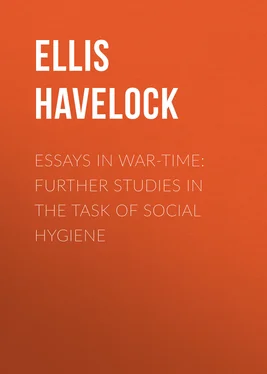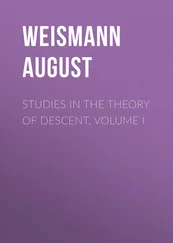Havelock Ellis - Essays in War-Time - Further Studies in the Task of Social Hygiene
Здесь есть возможность читать онлайн «Havelock Ellis - Essays in War-Time - Further Studies in the Task of Social Hygiene» — ознакомительный отрывок электронной книги совершенно бесплатно, а после прочтения отрывка купить полную версию. В некоторых случаях можно слушать аудио, скачать через торрент в формате fb2 и присутствует краткое содержание. Жанр: psy_sex_and_family, foreign_psychology, foreign_edu, на английском языке. Описание произведения, (предисловие) а так же отзывы посетителей доступны на портале библиотеки ЛибКат.
- Название:Essays in War-Time: Further Studies in the Task of Social Hygiene
- Автор:
- Жанр:
- Год:неизвестен
- ISBN:нет данных
- Рейтинг книги:5 / 5. Голосов: 1
-
Избранное:Добавить в избранное
- Отзывы:
-
Ваша оценка:
- 100
- 1
- 2
- 3
- 4
- 5
Essays in War-Time: Further Studies in the Task of Social Hygiene: краткое содержание, описание и аннотация
Предлагаем к чтению аннотацию, описание, краткое содержание или предисловие (зависит от того, что написал сам автор книги «Essays in War-Time: Further Studies in the Task of Social Hygiene»). Если вы не нашли необходимую информацию о книге — напишите в комментариях, мы постараемся отыскать её.
Essays in War-Time: Further Studies in the Task of Social Hygiene — читать онлайн ознакомительный отрывок
Ниже представлен текст книги, разбитый по страницам. Система сохранения места последней прочитанной страницы, позволяет с удобством читать онлайн бесплатно книгу «Essays in War-Time: Further Studies in the Task of Social Hygiene», без необходимости каждый раз заново искать на чём Вы остановились. Поставьте закладку, и сможете в любой момент перейти на страницу, на которой закончили чтение.
Интервал:
Закладка:
There is, however, one group of causes of war, of the first importance, which Dr. Woods has surprisingly omitted, and that is the group of political causes. It is by overlooking the political aspects of war that Dr. Woods' discussion is most defective. Supposed political necessity has been in modern times perhaps the very chief cause of war. That is to say that wars are largely waged for what has been supposed to be the protection, or the furtherance, of the civilised organisation which orders the temporal benefits of a nation. This is admirably illustrated by all three of the great European wars in which England has taken part during the past four centuries: the war against Spain, the war against France, and the present war against Germany. The fundamental motive of England's participation in all these wars has been what was conceived to be the need of England's safety, it was essentially political. A small island Power, dependent on its fleet, and yet very closely adjoining the continental mainland, is vitally concerned in the naval developments of possibly hostile Powers and in the military movements which affect the opposite coast. Spain, France, and Germany all successively threatened England by a formidable fleet, and they all sought to gain possession of the coast opposite England. To England, therefore, it seemed a measure of political self-defence to strike a blow as each fresh menace arose. In every case Belgium has been the battlefield on land. The neutrality of Belgium is felt to be politically vital to England. Therefore, the invasion of Belgium by a Great Power is to England an immediate signal of war. It is not only England's wars that have been mainly political; the same is true of Germany's wars ever since Prussia has had the leadership of Germany. The political condition of a country without natural frontiers and surrounded by powerful neighbours is a perpetual source of wars which, in Germany's case, have been, by deliberate policy, offensively defensive.
When we realise the fundamental importance of the political causation of warfare, the whole problem of the ultimate fate of war becomes at once more hopeful. The orderly growth and stability of nations has in the past seemed to demand war. But war is not the only method of securing these ends, and to most people nowadays it scarcely seems the best method. England and France have fought against each other for many centuries. They are now convinced that they really have nothing to fight about, and that the growth and stability of each country are better ensured by friendship than by enmity. There cannot be a doubt of it. But where is the limit to the extension of that same principle? France and Germany, England and Germany, have just as much to lose by enmity, just as much to gain by friendship, and alike on both sides.
The history of Europe and the charts of Mr. Baltzly clearly show that this consideration has really been influential. We find that there is a progressive tendency for the nations of Europe to abandon warfare. Sweden, Denmark, and Holland, all vigorous and warlike peoples, have long ceased to fight. They have found their advantage in the abandonment of war, but that abandonment has been greatly stimulated by awe of their mightier neighbours. And therein, again, we have a clue to the probable course of the future.
For when we realise that the fundamental political need of self-preservation and good order has been a main cause of warfare, and when we further realise that the same ends may be more satisfactorily attained without war under the influence of a sufficiently firm external pressure working in harmony with the growth of internal civilisation, we see that the problem of fighting among nations is the same as that of fighting among individuals. Once upon a time good order and social stability were maintained in a community by the method of fighting among the individuals constituting the community. No doubt all sorts of precious virtues were thus generated, and no doubt in the general opinion no better method seemed possible or even conceivable. But, as we know, with the development of a strong central Power, and with the growth of enlightenment, it was realised that political stability and good order were more satisfactorily maintained by a tribunal, having a strong police force behind it, than by the method of allowing the individuals concerned to fight out their quarrels between themselves.
Fighting between national groups of individuals stands on precisely the same footing as fighting between individuals. The political stability and good order of nations, it is beginning to be seen, can be more satisfactorily maintained by a tribunal, having a strong police force behind it, than by the method of allowing the individual nations concerned to fight out quarrels between themselves. The stronger nations have for a large part imposed this peace upon the smaller nations of Europe to the great benefit of the latter. How can we impose a similar peace upon the stronger nations, for their own benefit and for the benefit of the whole world? To that task all our energies must be directed.
A long series of eminent thinkers and investigators, from Comte and Buckle a century ago to Dr. Woods and Mr. Baltzly to-day, have assured us that war is diminishing and even that the war-like spirit is extinct. It is certainly not true that the war-like spirit is extinct, even in the most civilised and peaceful peoples, and we need not desire its extinction, for it is capable of transformation into shapes of the finest use for humanity. But the vast conflagration of to-day must not conceal from our eyes the great central fact that war is diminishing, and will one day disappear as completely as the mediaeval scourge of the Black Death. To reach this consummation all the best humanising and civilising energies of mankind will be needed.
VI
WAR AND THE BIRTH-RATE
During recent years the faith had grown among progressive persons in various countries, not excluding Germany, that civilisation was building up almost impassable barriers against any great war. These barriers were thought to be of various kinds, even apart from the merely sentimental and humanitarian developments of pacific feeling. They were especially of an economic kind, and that on a double basis, that of Capital and that of Labour. It was believed, on the one hand, that the international ramifications of Capital, and the complicated commercial and financial webs which bind nations together, would cause so vivid a realisation of the disasters of war as to erect a wholesomely steadying effect whenever the danger of war loomed in sight. On the other hand, it was felt that the international unity of interest among the workers, the growth of Labour's favourite doctrine that there is no conflict between nations, but only between classes, and even the actual international organisation and bonds of the workers' associations, would interpose a serious menace to the plans of war-makers. These influences were real and important. But, as we know, when the decisive moment came, the diplomatists and the militarists were found to be at the helm, to steer the ship of State in each country concerned, and those on board had no voice in determining the course. In England only can there be said to have been any show of consulting Parliament, but at that moment the situation had already so far developed that there was little left but to accept it. The Great War of to-day has shown that such barriers against war as we at present possess may crumble away in a moment at the shock of the war-making machine.
We are to-day forced to undertake a more searching inquiry into the forces which, in civilisation, operate against war. I wish to call attention here to one such influence of fundamental character, which has not been unrecognised, but possesses an importance we are often apt to overlook.
Читать дальшеИнтервал:
Закладка:
Похожие книги на «Essays in War-Time: Further Studies in the Task of Social Hygiene»
Представляем Вашему вниманию похожие книги на «Essays in War-Time: Further Studies in the Task of Social Hygiene» списком для выбора. Мы отобрали схожую по названию и смыслу литературу в надежде предоставить читателям больше вариантов отыскать новые, интересные, ещё непрочитанные произведения.
Обсуждение, отзывы о книге «Essays in War-Time: Further Studies in the Task of Social Hygiene» и просто собственные мнения читателей. Оставьте ваши комментарии, напишите, что Вы думаете о произведении, его смысле или главных героях. Укажите что конкретно понравилось, а что нет, и почему Вы так считаете.












